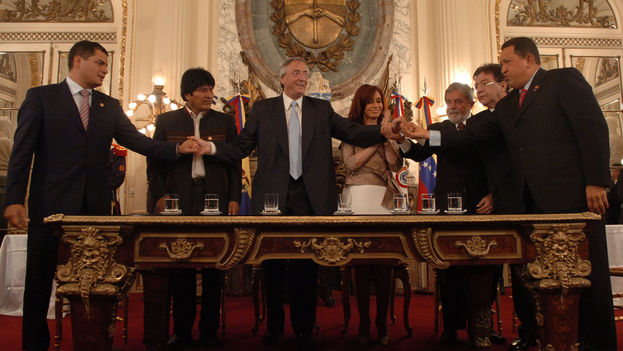
![]() 14ymedio, Pedro Campos, Havana, 24 May 2016 – The receding tide of the populist wave in Latin America, in particular the delicate situation in Venezuela and the ouster of Brazilian president Dilma Rousseff, has uncovered all kinds of speculation about the supposed relationship of cause and effect controlling political-economic and social process in Cuba.
14ymedio, Pedro Campos, Havana, 24 May 2016 – The receding tide of the populist wave in Latin America, in particular the delicate situation in Venezuela and the ouster of Brazilian president Dilma Rousseff, has uncovered all kinds of speculation about the supposed relationship of cause and effect controlling political-economic and social process in Cuba.
Those who are still waiting for the problems within the island to be solved believe they can be resolved from outside, while the ‘statist fundamentalists’ take advantage of the ‘threat’ to entrench themselves in their anti-democratic and anti-socialist positions.
However, Cuba is not Brazil or Venezuela, in any sense. Its processes have different origins, circumstances and dissimilar dynamics of development and, therefore, an evolution that proceeds along uneven paths.
Suffice it to recall that this populist wave began almost 40 years after the triumph of the Cuban Revolution of 1959, at a time of the sharp decline, due to natural exhaustion, and the disappearance of the socialist camp, and that Hugo Chavez came to power through democratic means, subject to the general principles of democracy and its mechanisms.
Now, it is precisely the setting aside of these democratic institutions and the assumption of authoritarianism that is at the center of the reversal of that wave.
This has nothing to do with the emergence and evolution of the Cuban political process, its origin and its authoritarian essence. It emerged as an offshoot of the violence and social polarization inherited from Batista’s coup d’etat and the subsequent armed confrontation. This made possible a government that went against the grain of the demand for democracy that served as a base of support for the fight against the Batista dictatorship and that was built on the confrontation between the United States and the USSR, during the Cold War.
The “socialism of the Cuban state,” which is neither socialist nor Cuban, was not what inspired this wave, but it rode it for its own benefit, encouraged the confrontation with “American imperialism” that feeds the geopolitics of its subsistence and, in any case, encouraged its authoritarian and state-centric tendencies that brought it to the current situation.
We mustn’t forget that it was Chavez and his oil that made possible the abandonment of the reforms forced by the fall of the socialist camp and the subsequent so-called “Special Period in a Time of Peace” in Cuba—a time of severe economic crisis after the loss of the Soviet subsidies.
We must also remember that the paradigms of the so-called 21st Century Socialism, which originated and gave strength to this wave, were related to democracy and participatory budgets leading to greater citizen involvement in decision making of all kinds, with the direct intervention of workers in the property, management and distribution of wealth and the Marxist concept of the law of value, pushed by Hugo Chavez, Heinz Dieterich and the People’s Summit held in Cochabamba, Bolivia, in 2006.
These fundamentals were never adopted by the Cuban government-party-state and later were gradually abandoned by Chavez himself in favor of state-centrism.
This phase of decline depresses the influence of the Cuban government in the region and could affect the support that, for Cuba’s state monopolies, are represented by Venezuelan oil and the billions of dollars Cuba obtains in “leasing fees” for Cuba doctors and paramedical personnel hired out in “medical missions” abroad.
But from there to an assumption that the Cuban government is threatened, is quite a stretch. To expect regional pressures in support of respect for human, political and civil rights, yes; to imagine a regional isolation similar to the 1960s, no. Suffice it to recall the new scenario in Cuba-US relations and the possibilities for economic exchange.
“Only Revolutionaries can destroy this Revolution,” Fidel Castro said in November 2005 at the University of Havana. This is true: the most dangerous enemies of the Cuban political process, who have been leading it to stagnation and to the “abyss,” are those who themselves are entrenched in power and who stubbornly impede the advance toward the democratization of politics and the socialization of the economy.
The political system defined by a dictatorship of the proletariat, originating in Stalinist Russia and perfected by the guerrillas in power, liquidated the opposition early on, eliminated its material base of support by nationalizing everything, and excluded all of the democratic mechanisms—multi-party elections and the full exercise of civil and political rights, the recall referendum process, impeachment, and a democratic constitution—essential to confronting authoritarianism. These mechanisms must be created from below.
Thus, democratization will be a process, not an act, that demands the creation of an atmosphere of relaxation and harmony that can facilitate an inclusive national dialog; the recognition of fundamental freedoms; moving to a new Constitution that is the fruit of the creation and democratic and horizontal discussion of the Cuban people and approved by referendum; promulgation of a new democratic electoral law; and the establishment of a modern state of law with full functional and informational transparency, under permanent popular control: a Republic that is democratic, humanist and supportive, one in which there is room for everyone.
